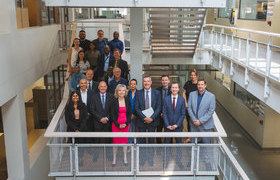Project to protect workers in digital gig economy
28 August 2018 | Story Helen Swingler. Photo Supplied. Read time 6 min.
The digital gig economy – short-term contracts outsourced via digital platforms – operates in unregulated ways, often leaving workers unprotected. But a new research project using South Africa as a case study aims to change that.
The project is a north–south collaboration, a coalition of law and social science researchers from the University of Cape Town (UCT) and the University of the Western Cape (UWC), along with Professor Richard Heeks of Manchester University, Professor Mark Graham of the Oxford Internet Institute and Dr Sandra Fredman of Oxford University. The total budget is over £600 000 with some £127 000 (over R2.3 million) going to UCT for the 30-month project.
The project will establish how policy and practice around online platform work can help support workersʼ rights. This will include the development of a code of practice and a Fairwork Foundation, which will operate much like the Fairtrade Foundation for goods and products.
Locally, UCT’s Professor Jean-Paul van Belle, director for the Centre for Information Technology and National Development in Africa (CITANDA) in the Department of Information Systems, is co-principal investigator for the social science component of the project. UWC’s Professor D’Arcy du Toit heads up the legal side.
Millions of workers at risk
Research shows that millions of workers worldwide belong to the gig economy. This “microwork” is a way of massively distributing big jobs across lots of workers, says Van Belle.
These digital platforms are transforming industries and creating new markets and opportunities. Uber and Airbnb are examples, and are important employment vehicles in Africa.
“The problem is that it’s a race to the bottom in terms of workers’ rights.”
“The problem is that it’s a race to the bottom in terms of workers’ rights, especially for the purely digital work,” says Van Belle.
“The South Africans get outbid by the Indians who get outbid by the Chinese. The platforms are often biased in favour of the job-giver.
“The supplying party is often powerless because of the communalisation of labour, and they lose the protection of formal labour practices: no pension scheme, sick leave, or decent work conditions. If you don’t get paid, there is seldom any recourse.”
The Fairwork Foundation project has established principles that ensure some fairness in work practices. These aren’t actual laws, nor have they been contextualised to specific platforms or countries, says Van Belle.
“The purpose of this research is to see whether we can take these principles and apply them to a specific context like South Africa.”
Ensure fairness
The potentials and risks of platform work touch down starkly in South Africa, a developing country that, by some measures, has the world’s highest income inequality, and 28% unemployment rates. The country’s well-developed internet infrastructure has brought a flood of potential platform workers online in search of opportunities.
“South Africa is the ideal place to begin the [Fairwork] scheme due to its advanced labour code and stable political and legal institutions, as well as the popularity of platform work,” says Graham, project lead and digital inequality expert.
The work will be approached from two angles. The first looks at introducing legislation to protect the workers, for example, as London has done for Uber taxis drivers.
“The country’s well-developed internet infrastructure has brought a flood of potential platform workers online in search of opportunities.”
“Where the platform companies can’t cope without the local market you can get them, through legislation, to abide by certain principles,” says Van Belle.
The second is accrediting these platforms.
“You can formulate mechanisms saying these platforms abide by the principles and certifying them, for example, with an ILO [International Labour Organisation] rating as a fair work platform or Fairwork certification. We will then follow up to see if it’s really effective in improving the life circumstances or working conditions of these people.”
Legislation and accreditation
This initiative, says Graham, will ultimately allow for the development of an international standard for good-quality digital working conditions.
Van Belle has already done some research. Last year his honours students did some preliminary research on microwork and the platform economy. A PhD student is looking at how local workers feel these are unfair trade practices.
The project will be delivered in five stages, with a 2021 completion date. As part of the project, a postdoctoral position at UCT is open for applications.
The project is funded by the UK Economic and Social Research Council as part of its GCRF New Models of Sustainable Development programme. For more information, visit www.fair.work
 This work is licensed under a Creative Commons Attribution-NoDerivatives 4.0 International License.
This work is licensed under a Creative Commons Attribution-NoDerivatives 4.0 International License.
Please view the republishing articles page for more information.
Research & innovation





































